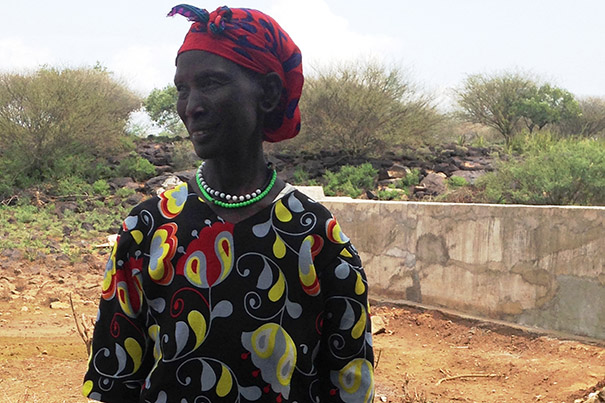Poverty is an epidemic in the Mondi area of Baringo County, Kenya. The terrain and climate of the region are rough, the road and communication infrastructure are poor and the region has been embroiled in protracted conflicts with neighboring communities.
Most important is the lack of access to safe and clean water for domestic use and for livestock, which is a key source of local livelihood. The area’s few rivers have been ravaged by recurrent drought in the past decades. Consequently, water is predominantly sourced from dams that are often miles from villages. Women spend incredibly valuable time each day simply obtaining clean water, and children are forced to drop out of school to help take care for their siblings among other household chores.
The Aprio Yonoo Water Project
Relieving hunger and eradicating poverty in the Mondi area has to begin with access to water. CWS, together with our local implementing partner Farming Systems Kenya, has been involved with water and sanitation programs in the region, dubbed Water for Life. The program employs integrated holistic approaches that cut across community socio-economic sectors, and seeks to progressively improve availability, accessibility and sustainable utilization of water and related resources at the community level.
In this region, the program has constructed an innovative, cost effective and environmentally sound 50,000 cubic meter weir, which captures and stores rainwater. Over time, groundwater levels rise, making it easier for community members to collect and store water. Construction on the weir ran from April of 2014 until June 2015. In addition to construction of two troughs for livestock. The weir will benefit nearly 10,000 people.
In our work, one new project often has an amplified effect in the community. In this case, the water that is left over from the weir seeps into the ground to create more fertile fields. Consequently, the community has established a demonstration farm with fruits, vegetables and trees. The program also facilitated the construction of two gender segregated latrines and raising of the water tank base at Napeikore primary school.
The weir was completed in June of 2015, but the Water for Life program isn’t finished. CWS has recognized the need to build greater capacity of the Mondi people to withstand shocks and is transitioning to a new project phase to continue addressing the growing water and related needs of the region. Also critical to the long-term success of the project is the community-formed water management committee dubbed Aprio Yonoo that is tasked with maintaining the wier. The group received lessons on on group leadership, group registration, conflict management, record keeping, financial management, resource mobilization, water hygiene and sanitation, HIV/AIDS and environmental conservation.
Yunis’s story
When visiting Mondi, it is hard to miss the impact of the Aprio Yonoo Water Project to the Mondi people. I talked to Yunis, a 50-year-old mother of four who openly acknowledged the positive impacts that the project has had in her life, the main being huge relief that comes with no longer having to endure the lengthy and backbreaking task of fetching water. In her words, “I used to wake up as early as 5 am to start the search for water, and coming back at 11 a.m. because of the heavy water load.” Between the six-hour process of collecting water and cultural expectation that women have responsibility for cooking and cleaning their households, there was little time left for cultivating fields, tending crops or other pursuits.
Now, Yunis is proud as she describes her better access to water, thanks to the weir. She now spends her free time cultivating crops, planting maize, beans and millet.
The proceeds from her farm have not only enabled her to keep her children in school, but she can also now meet other basic needs in her household: “I sell the produce and the little money I get I use to buy sugar, soap and paraffin for lighting.”
A regional inspiration
We also talked to two county government officials who were familiar with the Aprio Yonoo Water Project. They acknowledged that water was a great challenge in the area, and they recognized and appreciated the partnership between CWS and FSK that constructed the weir.
The officials noted that before the weir, the community only had two water pans that would dry up in late January, plunging the community into five months without a water source. In those months, women walked up to 15 kilometers – more than nine miles – daily for clean water. Now those women have time to run businesses and farm. In their words, “The weir has led to increased community settlement, more children enrolled in schools and a church set up.”
To cap it all off, the officials noted that the weir is a source of inspiration to the rest of the county as it was a first of its kind in the region!
CWS’s Water for Life Program has successfully facilitated the implementation of Water for Life projects in 182 communities across the drylands of Kenya – Kitui, West Pokot and Turkana – as well as Tanzania’s Morogoro.
Caleb Wafula is the Program Development Assistant with CWS Africa.

